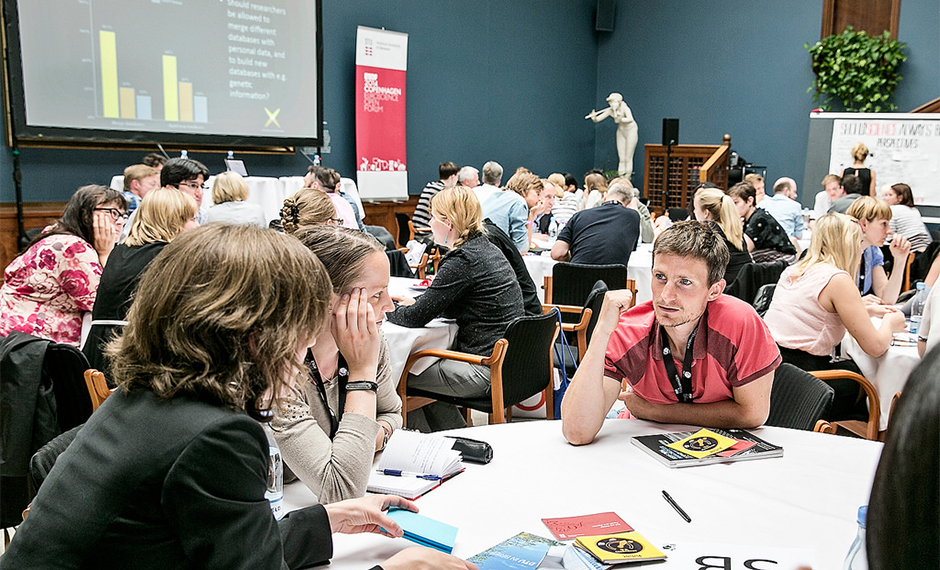What can you gain from opening up your data? What is the balance between benefits and concerns in relation to openness to knowledge and data? Does openness pose risks for privacy and patients?

Those were key questions discussed at a dialogue seminar arranged by the Swedish association VA (Public & Science) and the Technical University of Denmark, DTU, at the Euroscience Open Forum in Copenhagen, Denmark on 25 June 2014.
Progress comes from a free exchange of ideas, said Mike Taylor, Research Associate in Earth Sciences at the University of Bristol, UK:
“There is a natural tendency to share in the research community, and network effects hugely increase the value of research.”
Historically, the barrier to sharing knowledge was how to copy papers. The invention and development of different printing techniques led to an expansion in knowledge sharing. But copies still had to be physically sent around. The world wide web was invented to solve this problem.
Publishing is meant to open up the world. But according to Dr. Taylor, publishing organisations are reluctant to employ an open access approach due to a loss of revenue.
“An industry that lives on sharing knowledge is trapped by an industry that locks the knowledge in. Publishers can complain about their lack of market success. The cost of NOT being open – the opportunity cost – is harder to measure,” he stated.
Best ideas come from outside
Roland Harwood, Co-Founder and Networks Partner at the organisation 100%Open, a specialist open innovation agency based in the UK, explained how businesses can benefit from engaging in open innovation processes.
“Smart companies know that the best ideas come from people outside of their organisation. Most of the smartest people work for someone else (quoting Bill Joy, Sun Microsystems) but the web makes it possible to have conversations with those people. Efficiency is the ultimate goal,” he said, and shared a few examples of successful open innovation projects.
“Open innovation is not about buying and selling ideas, but sharing risks and rewards. Unfortunately, companies are not keen on sharing the rewards,” he said.
Roland Harwood agreed with Mike Taylor that academia is excellent at collaborating with other institutions and at co-creating new knowledge:
“Science is already open. The question is: How do we as stakeholders deal with that?”
Respect people’s privacy and investment
In Sweden, scientists have access to many large databases set up by authorities that contain large amounts of data and long time-series. Utilising the databases, scientists can create new knowledge. But most people think scientists should have only limited access to databases with personal data, according to a study conducted by VA on public attitudes in Sweden. Also, people tend to be more positive towards medical researchers using databases than social scientists. And generally speaking Swedes have confidence in how researchers use the data.
“If integrity issues are not dealt with, it could lead to a decrease in confidence and as a consequence a loss in people’s willingness to pay for research”, said Karin Larsdotter, analyst at VA.
“We should have much more balanced statements about open data,” said Kaare Christensen, Professor of Epidemiology at the University of Southern Denmark.
He argued that openness depends on the incentives of various sectors to keep the data open, e.g. science, companies and healthcare. Also, the level of openness may differ depending on the stage that the research is at. Once the data is used, privacy becomes important. Individuals should have the right for information about them to remain private and there should be strict regulations about how to use the data. In Scandinavia, authorities have been very open to research and have developed a system for being open with certain restrictions.
“We have to have respect for people’s privacy and investment,” said Kaare Christensen.
The more openness the better
After the presentations, the moderator, Ivo Grigorov from the Technical University of Denmark, invited all participants to round table discussions about the pros and cons of open data, open innovation and open science. Notes from the discussions can be found in the graphic summary of the session.
Carl Johan Sundberg, Professor at the Karolinska Institute in Sweden and one of the founders of ESOF, facilitated the latter half of the session where comments were exchanged between the audience and the speakers.
One delegate asked if open innovation means there should be no patents or whether there are any other viable models.
“We still have to reward the people and companies developing new ideas but we need a more agile patent system,” said Roland Harwood.
“We also need different solutions in different fields. There is a difference between a medical company and a software company,” Mike Taylor added.
Another question highlighted the cost of curating the data. Kaare Christensen considered this to be a key point.
“There is an excitement about keeping data open, but who takes care of the maintenance? In healthcare, an enormous amount of effort goes into cleaning the data,” he said.
A delegate wondered whether there are any benefits to full disclosure of research data, thereby revealing the identities of the research subjects.
“The more openness the better, but you must protect personal integrity. Otherwise you will lose public trust,” commented Karin Larsdotter.
Additional session materials can be downloaded from the links below.
Graphic summary of the session

Session slides

Report: Anders Sahlman
Photos: Esben Salling

Great summary of the session. Being one of the organisers (from DTU side) I have to say it was a pleasure sharing this session with VA. I think our mutual interest in openness as a driver for progress allowed us to create greater value than what would have happened otherwise.
Great summary of the session. Being one of the organisers (from DTU side) I have to say it was a pleasure sharing this session with VA. I think our mutual interest in openness as a driver for progress allowed us to create greater value than what would have happened otherwise.